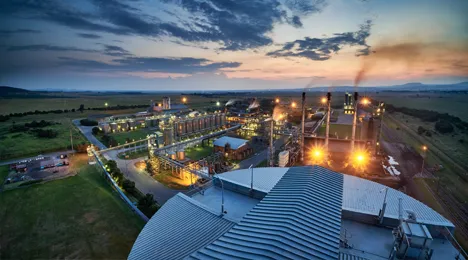Barloworld's interim earnings drop amid ongoing Zahid Group takeover attempt
Heavy equipment

A 550 kVA Cat C15 diesel generator set being assembled at Barloworld Power’s Boksburg facility. The group is experiencing tough trading conditions in line with macro-economic volatility in the markets where it operates, especially in its Russia business, where sales have declined due to the impact of sanctions.
Image: Barloworld.
Barloworld, still the subject of a controversial takeover bid by Saudi Arabia-based Zahid Group and CEO Dominic Sewela, nearly halved its interim dividend to 120 cent a share (210 cents per share).
This followed a 20.5% decline in headline earnings per share (HEPS) to 423.2 cents for the six months to March 31, with the results impacted by a weak performance in the Russia business due to the impact of sanctions in that country.
Many JSE listed companies exited their businesses in Russia after the onset of the war in Ukraine, but Barloworld opted to retain Vostochnaya Technica (VT). Excluding VT, normalised HEPS was flat at 356 cents per share.
Sewela said trading conditions were broadly aligned with their expectations of stable to modest economic growth, guarded optimism, moderated by cyclicality and subdued commodity markets.
"Barloworld has shown remarkable resilience, especially excluding the VT results. The positive impact of the restructuring of Ingrain in 2024 is especially evident. We continue to navigate the evolving environment by pulling the levers within our control,” said Sewela in a statement.
Regarding the Zahid takeover bid that was initially rejected by shareholders, an announcement about the requisite 90% acceptances from shareholders to be received in terms of a standby offer, or whether the bidding company wishes to waive the threshold, was expected to be made by June 30, 2025.
Group revenue fell by 5.8% to R18.1 billion, weighed down by a significant reduction in VT revenue. “The board remains vigilant in overseeing the investment in VT and will conclude and communicate an official strategy in due course,” the board said in the results..
Earnings before interest, tax, depreciation and amortisation (EBIDA) fell by 9.1% to R2.2bn. Excluding VT revenue EBITDA increased by 3%.
The EBITDA margin fell to 12.4% from 12.9%. Excluding VT, EBITDA margin expanded from 11.9% to 12.5%.
The group invested in working capital to support growth objectives and used free cash flow to reduce floor plans, which were more expensive than its available facilities. As a result, net debt increased by R1.6bn to R4.8bn. Net asset value per share increased to 9 235 cents from 9 111 cents. Solvency and liquidity remained strong.
On the outlook, Sewela said that since the end of the first quarter, financial markets and commodities were very volatile, rapidly reacting to developments regarding US tariffs and associated uncertainties.
“In such an unpredictable environment, effective risk management and scenario planning are crucial, especially for complex supply chains as well as the fragile geopolitical state of affairs.”
The board said several major South African mining corporations reported that, despite prevailing market turbulence, primary commodity trade routes were largely unaffected due to the exclusion of platinum group metals, coal, gold, manganese and chrome from tariff implications.
“We continue to assess the potential impact of tariffs on our iron ore, steel, and diamond customers.” Some reorientation and dislocation of physical trade flows was anticipated in the near future, which could present both opportunities and challenges for Barloworld’s customers.
“The potential consequences of slower economic growth and a fragmented trading environment may be more significant. The future effects of tariffs on our business remains uncertain, and we are mapping out the medium- to long-term ramifications for our business,” the board said.
The US Department of Commerce's Bureau of Industry and Security (BIS) had extended a deadline to September 2 for Barloworld to complete an investigation on potential export violations.
VT’s EBITDA fell 68.1% to R133 million. Operating profit of R104m decreased by 73.1% compared to the prior period. VT was expected to trade at breakeven levels as the structure was optimised for lower activity levels. VT was self-sufficient in terms of its funding requirements.
EBITDA for Equipment Southern Africa fell 1.9% to R1.3bn. Operating profit declined 15.1% - the margin reduction resulted mainly from changes in the sales mix, from lower aftermarket activity.
EBITDA for Equipment Mongolia increased 14.5% to R549m on an EBITDA margin of 23%, which was below the prior period margin of 24.7%. Operating profit of R496m increased by 15.9%.
Ingrain’s EBITDA of R411m and R265m operating profit from its starch, glucose and related products operations were above the prior period by 10.1% and 13.7%, respectively. The EBITDA and operating profit margins of 12.9% and 8.3%, respectively, were higher than the preceding period margins of 11.7% and 7.3%, respectively, reflecting cost reduction benefits.
Visit: www.businessreport.co.za